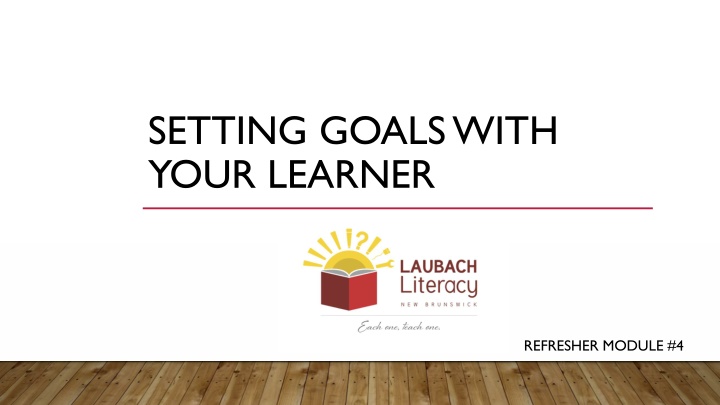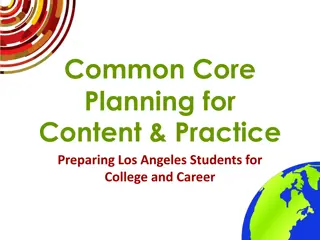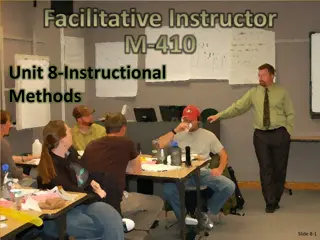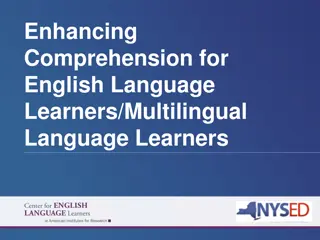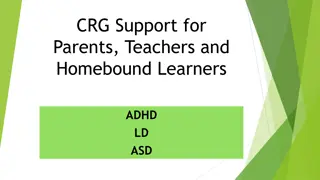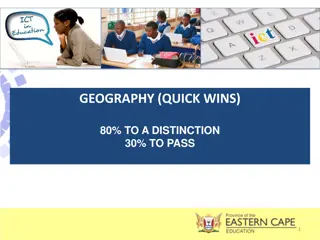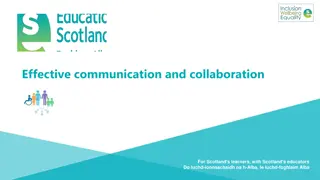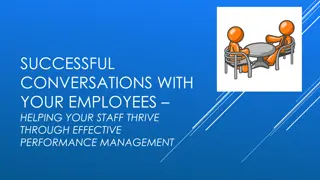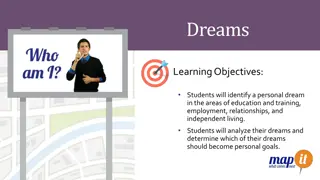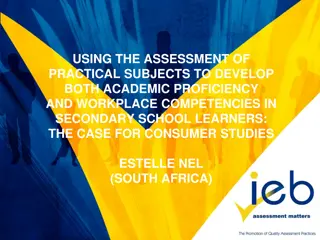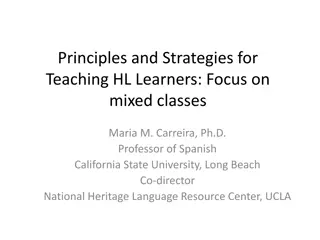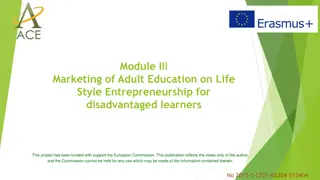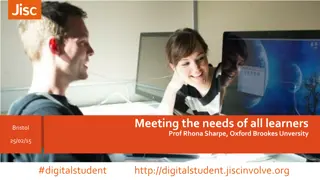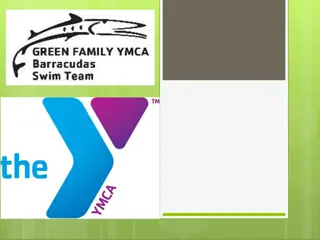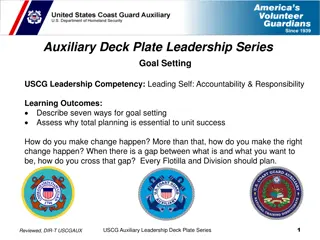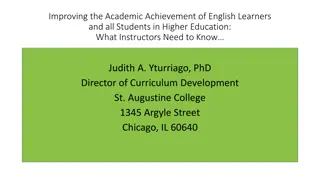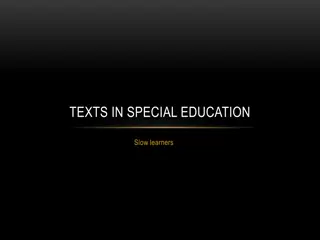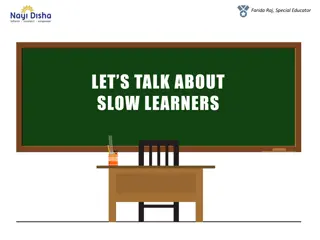Effective Goal-Setting Strategies for Learners
Enhance your tutoring skills by learning how to set effective goals with your learner. This module covers topics such as getting to know your learner, elements of the goal-setting process, tips for setting goals, and developing SMART goals. Explore probing questions for ESL learners and learner history to personalize the learning experience. Discover sample questions to facilitate meaningful interactions and improve learner engagement.
Download Presentation

Please find below an Image/Link to download the presentation.
The content on the website is provided AS IS for your information and personal use only. It may not be sold, licensed, or shared on other websites without obtaining consent from the author.If you encounter any issues during the download, it is possible that the publisher has removed the file from their server.
You are allowed to download the files provided on this website for personal or commercial use, subject to the condition that they are used lawfully. All files are the property of their respective owners.
The content on the website is provided AS IS for your information and personal use only. It may not be sold, licensed, or shared on other websites without obtaining consent from the author.
E N D
Presentation Transcript
SETTING GOALS WITH YOUR LEARNER REFRESHER MODULE #4
OBJECTIVES Getting to know your learner Elements of the goal-setting process Tips for setting goals Matching goals with learning objectives and evaluation Exercise: Developing SMART goals from a sample learner profile
GETTING TO KNOW YOUR LEARNER What sort of questions can you ask about: Interests, hobbies, activities Favourite subjects when they were in school Travel or vacations Reading experiences Their job / volunteer experiences Family, friends
SAMPLE QUESTIONS What kinds of activities do you like to do? What kinds of movies or television programs do you like best? Why? What sort of book or story do you enjoy? Why? In your spare time, what do you like to do? Did you have a favourite subject in school? What was it? Was there a time when you enjoyed reading? Are there things in your job (life) that you need to be able to read but cannot? What do you do? How do you get your news now? If you won the lottery a million dollars what would you do?
PROBING QUESTIONS ESL Learners What is your first language? How old were you when you learned to speak English? When did you come to Canada? What did you study at school in your native country? Do you read and write in your own language? What language do you speak at home with your family?
PROBING QUESTIONS Learner History What kind of things do you read or write now? What about that do you find difficult? How do you cope with these tasks? Do you have any problems with your eyesight or your hearing which may make this more difficult? What have you found helps you in learning new things? Is it easier to remember a phone number by hearing it, seeing it or dialing it?
SMART GOAL SETTING Each council may do things a little differently but generally, the tutor coordinator will provide an initial learning plan and goals to the tutor. This may be the initial goals, but over time you will be able to create more with your learner. Goals should be S-M-A-R-T: S - specific M - measurable A - attainable R - realistic T - times
ELEMENTS OF THE GOAL SETTING PROCESS Identify short- and long-term goals. Break goals into small segments and be as specific as possible. Determine steps to achieve each goal. Determine which goals are the most important to work on first. Develop a timeline for accomplishing each goal. Identify how you will know when a goal is reached. Record each goal in Learning Goals section of the database. Revisit frequently and add progress notes or completion dates when accomplished. Celebrate accomplishments.
TIPS FOR SETTING GOALS Include your learner in the planning process. Ask your learner what they hope to accomplish. Establish realistic time frames for achieving the goal. Have both short- and long-term goals. Review the goals often because they can change.
THE DATABASE ADDING LEARNING GOALS
LEARNING OBJECTIVES Learning Objectives Improve Reading Improve Comprehension Skills Improve Writing Improve Spelling Improve Math Skills Improve Budgeting Improve Computer Skills Prepare for GED Improve my understanding of spoken English
GOALS AND EVALUATION Evaluation Learning Goals Read a menu Understand my water bill Read Green Eggs and Ham to my grandson Send an email Look up the news online Write my name Understand what my son s teacher is telling me. Read a prescription Can order on their own at restaurant Can navigate the water bill/answer questions about it Can read the book Can email their tutor Find CBC online Write their name and sound it out Be comfortable in a conversation with the teacher Understand what the directions on the prescription mean
LEARNER PROFILE Although Alvina s brothers and sisters went to school, she was kept home to help with the household chores. Now that her children are grown, she would like to learn to read and write. Alvina is a mother and a grandmother. She left her rural home when she was about 18 and worked as a live-in housekeeper for a city family. Since marrying, she has helped manage family-run businesses. She has four children and five grandchildren. The youngest, a two-year-old girl, is the apple of her eye. They spend a lot of time together. At the start of tutoring, Alvina recognized most alphabet letters and knew some of the sounds. She recognized some words on sight. She could use consonant letters to spell words when they were dictated and could sign her name. She knew the order of the alphabet; she had used alphabetical order to keep track of files in the family business. Alvina would like to be able to read a story to her youngest grandchild, and one day help the others with their homework. She loves cooking but wants to try new things and would need to be able to read a recipe to do that. She would also like to share her recipes with her family but is unable to write them out.
EXAMPLE 1 OBJECTIVES, GOALS, EVALUATION Learning Objectives Learning Goals Evaluation method for goal Improve Reading Read to grandchildren Can read the book(s) her grandchild likes UNCLEAR reading, writing, maybe math? Help grandchildren with their homework Need more information Improve Reading Read Recipes Can read and cook successfully new recipes Improve Writing Write out her recipes to share with family and friends Can write out a recipe of her own
EXAMPLE 1 SMART GOALS GOAL SPECIFIC MEASURABLE ATTAINABLE REALISTIC TIME Write a recipe Yes Share her homemade shortbread recipe with her family Yes when it s done it s done. Yes it is a short recipe, with few ingredients or directions Christmas of next year Read Recipes Read to Grandchildren
CONCLUSION If you have further questions, please discuss with your tutor coordinator Or contact LLNB at info@llnb.ca or 1-877-633-8899
